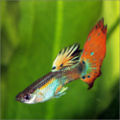Carotenoids
Contents
| You can contribute to the Aquarium Wiki by expanding this article. Dont be shy!. |
What are they[edit]
Carotenoids are organic pigments that are naturally occurring in plants and some other organisms like algae, some types of fungus and even some bacteria.
They are added in aquarium food to provide essential minerals to aquatic animals which aids the animal in keeping its skin colour and general well being.It is also believed to boost their immune system.
Carotenoids are not produced by the animal but have to be consumed regularly in order to build up in the skin cells of the animal and thereby giving fish and other animals (like amphibians) their distinctive colours.
Krill and spirulina contain natural high levels of these chemicals and so you often find these added to commercial food to promote colour building.
Types of Carotenoid[edit]
Astaxanthin[edit]
This is produced by the micro algae Haematococcus pluvialis. This food is a powerful anti-oxidant. One comprehensive study found astaxanthin to be 10 times as effective as beta-carotene (and approx 100 times more effective than vitamin E) (Di Mascio et al-1991).
Canthaxanthin[edit]
Phaffia Yeast[edit]
Usually supplied as a powder. This yeast contains a number of carotenoids.
- It can take up to 45 days for a fish to recover its full colour.
Carotene[edit]
Carotenes include: α-Carotene, β-Carotene, γ-Carotene, δ-Carotene, Lycopene, Neurosporene, Phytofluene, Phytoene.
Links[edit]
Commercial fish foods with added Carotenoids[edit]
- Tetra Colour Crisps
- Tetra Ruby Flake
- Interpet Tropical Fish Flakes
- Hikari Algae Wafers
- Hikari Flake Tropical
- Hikari Goldfish Gold
- Hikari Oranda Gold


